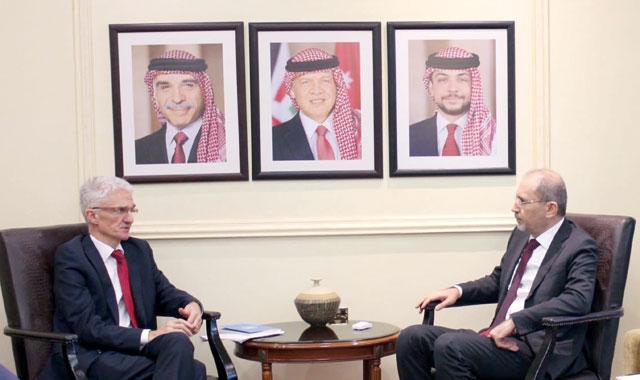You are here
‘Why do refugees refuse to go back to Syria?’ Report explores reasons of reluctance
By Ana V. Ibáñez Prieto - Apr 18,2018 - Last updated at Apr 18,2018
AMMAN — Despite the increasingly difficult challenges they face, most Syrian refugees in Jordan and Lebanon are still unwilling to return to their homelands unless a political transition takes place, according to a report launched by the Carnegie Middle East Centre (CMEC) in Amman on Wednesday.
“As the Syrian regime regains territory, there have been growing calls in neighbouring countries for refugees to go home. Yet, refugees stick to some conditions for a return — conditions that political efforts to resolve the Syrian conflict have largely ignored,” Director of the Carnegie Middle East Centre Maya Yahya said, pointing out that “what is most striking is that, despite the negative experiences they have as refugees, they are still reluctant to go back until their safety and security, access to justice, and right of return to areas of origin are ensured”.
Former minister of justice Bishr Khasawneh said: “The Jordanian government believes that the conditions required for the voluntary return of refugees to their homeland are achievable,” noting that “the deescalation zones established in Syria might be a good first step on the way to creating good return conditions”.
However, the Carnegie report was not optimistic about this solution, stating that “refugees reject any proposals that could lead to Syria’s fragmentation, oppose the idea of de-escalation zones, and have no confidence in safe zones”.
On the situation of Jordanian people in light of the refugee crisis, Khasawneh said: “The host communities have been exerting great efforts to absorb the refugee influx, but the international community is not bringing enough attention to the improvement of their conditions,” calling on the concerned institutions to focus on the welfare of the host communities.
Regarding the views expressed by refugees living in Jordan and Lebanon, Yahyia explained that “they have no confidence in the political actors involved in Syria, and most anti-regime refugees do not believe the opposition truly represents them”.
“Women and young men are among those most fearful of returning to Syria, as they are concerned about the lack of security and possible persecution,” the expert continued, adding that “as the war drags on and conditions in their host countries worsen, an increasing number of refugees are considering resettling outside the region — particularly in Europe”.
“Unheard Voices: What Syrian Refugees Need to Return Home” is the culmination of 14 months of research started with CMEC’s “Triggers of Return” project, which sought to improve the understanding of Syrian refugees' requirements for a potential political solution to the conflict.
Based on focus group discussions with Syrian refugees in Lebanon and Jordan and a series of workshops with NGO professionals, the study offers policy recommendations that place refugees' demands at the centre of any sustainable political resolution of the conflict.
“A safe and sustainable return of refugees requires a framework that acknowledges the political roots of the Syrian crisis rather than just its humanitarian dimension, concedes that peace is not possible without justice, and recognises the right of refugees to return to their areas of origin,” the report said, pointing out that “safety and security can only be guaranteed through a political process that creates inclusive governance mechanisms, ends criminal impunity, and facilitates reintegration, demilitarisation, and access to justice”.
“While this process will take time given the many forces operating in Syria, efforts to prepare refugees for a return should begin now,” Yahyia pointed out, recommending the creation of a cadre of Syrian lawyers and paralegals to inform refugees of their rights and help resolve the many anticipated local disputes.
In addition, the report called for the establishment of networks of trusted community mediators, warning that reconstruction funding should not “inadvertently empower the Syrian regime”.
Related Articles
AMMAN —The Kingdom and the United Nations World Food Programme (WFP) on Thursday discussed means of enhancing cooperation, according to a Fo
AMMAN — Foreign Minister Ayman Safadi and UN Under-Secretary-General for Humanitarian Affairs and Emergency Relief Coordinator Mark Lowcock
AMMAN — The number of Syrian refugees returning voluntarily to Syria from Jordan has been “slightly” rising since a tripartite agreeme

















